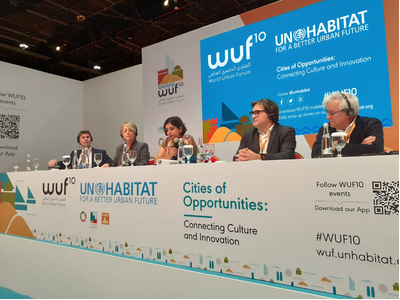- The Ministry of Territory and Sustainability argued that all social and economic actors and levels of government should be involved in formulating agendas for sustainable urban development
- The Catalan government is participating in the 10th UN World Urban Forum and has also taken part in the World Assembly of Local and Regional Governments

The Secretary for the Urban Agenda and Territory, Agustí Serra, has argued for a multilateral approach and the involvement of regional governments in the drafting and implementation of urban agendas at the 10th World Urban Forum (WUF), currently under way in Abu Dhabi (United Arab Emirates).
The World Urban Forum is a non-legislative technical forum, convened by the United Nations Human Settlements Programme (UN-Habitat), that has been held since 2002. It is the main high-level international platform for discussing the accelerating process of urbanisation and its consequences.
Participants discuss a range of issues, including progress being made in the application of the New Urban Agenda, which was adopted at the global level in 2016, and which countries and regions are applying through their own urban agendas. Catalonia, in particular, is currently in the process of drafting the Urban Agenda for Catalonia. Urban agendas are the road maps that will guide sustainable development of cities over the coming decades.
Integrated responses for sustainable urban development
The Catalan Ministry of Territory and Sustainability organised two events within the framework of the World Urban Forum, both of which were held today. First, the Ministry coordinated a discussion on “The implementation of four sub-national strategic plans within the EU”, in which participants presented and discussed the urban agendas of the Basque government, the Finnish autonomous province of Åland, and the German city of Bonn, as well as the Urban Agenda of Catalonia.
Discussion focused on the objectives set out in the agendas, challenges, instruments used to carry them out, proposed performance indicators, and the approach to drafting and applying the strategic plans. Secretary Serra said: “Global agendas are ideal strategic instruments for addressing contemporary issues, which are interconnected, complex and increasingly urgent”, and which require “integrated responses that put citizens at the centre of the action”.
Serra cited the Urban Agenda for Catalonia – drafted by the Urban Assembly of Catalonia, a body that includes representatives of all levels of government as well as economic, social and academic actors – as an example of the multilateral approach that he advocates. According to the secretary, “the Agenda was developed in a way that encourages dialogue and the search for common ground” and “takes citizens into account in the most integrated way possible” through the participation of civil society organisations in the Assembly and the use of participatory processes.
Multilateralism between levels of government
The second event organised by the Ministry of Territory and Sustainability was a discussion on implementation of urban development agendas from a multi-level perspective: global, European and regional.
Given the complexity of the urban phenomenon, agendas for urban development must be formulated with the participation of different levels of government. “Nation states are privileged actors in this multilateral process, but they may not be very agile when it comes to meeting the needs of cities,” said Serra. “Cities and regions can take action at levels that are closer to citizens, but they need tools to make their action more effective,” he added. The secretary therefore stressed the importance of “urban multilateralism”.
Participation in the World Assembly of Local and Regional Governments
Secretary Serra also participated in the World Assembly of Local and Regional Governments, one of the sections into which the World Urban Forum is divided in order to give greater voice to sub-national governments. The secretary took part in a roundtable on the use of new technologies by local and regional governments for the benefit of their communities.